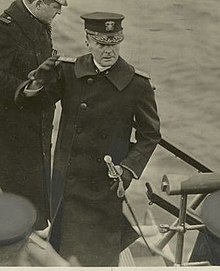Thomas S. Rodgers
| Thomas S. Rodgers | |
|---|---|

Admiral Rodgers, center, coming aboard the Presidential yacht Mayflower, December, 1918.
|
|
| Born |
August 18, 1858 Morristown, New Jersey |
| Died | February 28, 1931 (aged 72) New York City, New York |
| Allegiance |
|
| Service/branch |
|
| Years of service | 1878–1919 |
| Rank |
|
| Commands held | Battleship Division Six, Atlantic Fleet Battleship Division Seven, Atlantic Fleet |
| Battles/wars |
Spanish–American War World War I |
| Awards | Navy Distinguished Service Medal |
| Relations |
|
Rear Admiral Thomas Slidell Rodgers (18 August 1858 – 28 February 1931) was an officer in the United States Navy who served during the Spanish–American War and World War I.
Born at Morristown, New Jersey, Rodgers was a scion of one of the most famous naval families in American history. His great-uncle, Commodore John Rodgers, had commanded American forces during the First Barbary War and was the senior officer in the United States Navy at the outbreak of the War of 1812. His maternal great-grandfather was Captain Christopher Raymond Perry, who fought in the Quasi-War with France and was the father of naval heroes Oliver Hazard Perry and Matthew Calbraith Perry. Thomas Rodgers's father was Rear Admiral Christopher Raymond Perry Rodgers, and his older brother, Raymond Perry Rodgers, would also reach the rank of Rear Admiral. At one point or another during the first 25 years of the 20th century, five members of the Rodgers family were active flag officers in the U.S. Navy.
Following in the family footsteps, therefore, Rodgers attended the United States Naval Academy, from which he graduated in 1878. Details of his service during the first twenty years of his career are slim. It is known from sources, however, that he had achieved the rank of Lieutenant no later than 1894, when he served aboard Chicago. During and after the Spanish–American War, Rodgers served aboard Bennington. It is likely that this service included participation in the annexation of Wake Island on January 17, 1899. Promoted rapidly through the ranks following the end of the War, Rodgers served as executive officer of the battleship Maine, with the rank of Commander, from 1902 to 1905. Varied service ashore and afloat led to promotion to the rank of Captain, and in 1910, Rodgers was given command of the battleship New Hampshire, the last pre-dreadnought built for the U.S. Navy. In 1911, he was appointed to the post of Supervisor of New York Harbor, and in 1912, Rodgers succeeded Captain Templin M. Potts to become Director of Naval Intelligence, a position largely developed by his older brother Raymond Perry Rodgers, the second holder of that office.
...
Wikipedia
